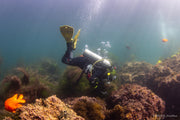
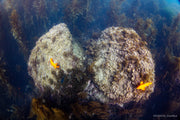

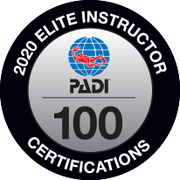
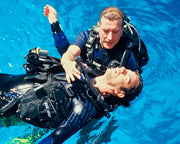
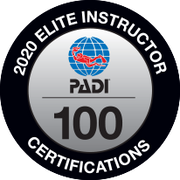
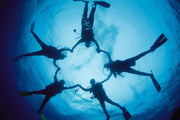
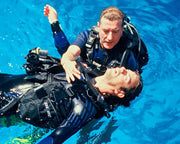
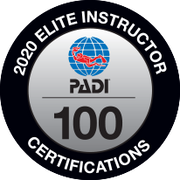
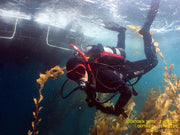
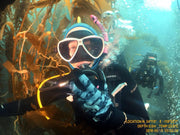
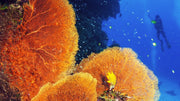

We offer a FREE Advanced Course to anyone who buys their BCD and Regulator in our shop. Call us for more details at (323) 641-7416.
This course can be taken after completing the PADI Open Water Diver certification. It's titled PADI Advanced Open Water Diver because it advances your diving knowledge & skills.
Why Take This Course?
Academic Plan
Course Materials
Beyond basic scuba equipment, you’ll need a compass and dive knife. Specialized gear depends on chosen Adventure Dives. Your instructor will guide you on additional gear like a lift bag for Search and Recovery diving.
Invest in your own BCD and Regulator, and we will waive the $350 base fee for the Advanced Course. Practice with your own gear during all 6 ocean dives with your instructor.
Benefits
Call us at (323) 641-7416 or visit our shop to get started. Purchase the Adventures in Diving manual and watch the Adventures in Diving video. Once enrolled, you’ll receive your materials and start learning. Your instructor will schedule knowledge review sessions and specialty dives.
Learn to prevent and manage problems in the water, becoming more confident in your diving skills. This challenging yet rewarding course will enhance your ability to help others and improve your self-rescue skills.
Total Estimated Cost: ~$1'200 to $1'400
Contact Us
Q: What makes the PADI Rescue Diver course special? A: This course is both challenging and rewarding, providing you with essential skills to manage and prevent dive emergencies.
Q: What additional costs should I expect? A: Besides the course fee, budget for 2 boat trips, a pool session, course materials, and any personal gear like a pocket mask and flashlight.
Q: Can I get college credit for this course? A: You may be eligible for college credit—ask your instructor for more details.
The lure of the deep. There’s something exciting and mysterious about exploring deeper dive sites while scuba diving. Sometimes it’s a wreck that attracts you below 18 metres/60 feet, and on wall dives it may be a giant fan or sponge. Whatever it is, to scuba dive with confidence at depths down to 40 metres/130 feet, you should take the PADI Deep Diver Specialty course.
If you’ve earned the PADI Adventure Diver rating or higher, and you’re at least 15 years old, you can enroll in the Deep Diver course.
Your training starts by reviewing reasons for deep diving and how important it is to know your personal limits. During four deep dives with your instructor, you’ll go over:
Also, the first dive of this PADI Specialty Diver course may credit as an Adventure Dive toward your Advanced Open Water Diver certification – ask your instructor about earning credit.
You’ll need a dive computer along with the rest of your basic scuba equipment. A dive light and slate are also recommended. Your PADI Instructor may suggest other gear appropriate for local deep diving.
Q. What do I do after purchasing the Deep Diver Specialty Course?
After you purchase the Specialty Course, an instructor will contact you according to your account via email or phone call. Then, you will schedule for meeting.
You will come to our dive shop on the scheduled day and will go through orientation, instuctions, and you will schedule further appointments for swimming pool and ocean dive sessions.
Learn to prevent and manage problems in the water, becoming more confident in your diving skills. This challenging yet rewarding course will enhance your ability to help others and improve your self-rescue skills.
Total Estimated Cost: ~$1'010 - $1'250
Contact Us
Q: What makes the PADI Rescue Diver course special? A: This course is both challenging and rewarding, providing you with essential skills to manage and prevent dive emergencies.
Q: What additional costs should I expect? A: Besides the course fee, budget for 2 boat trips, a pool session, course materials, and any personal gear like a pocket mask and flashlight.
Q: Can I get college credit for this course? A: You may be eligible for college credit—ask your instructor for more details.
Much of the world’s best scuba diving is accessible only by boat. Whether you’ve never made a boat dive or you’ve logged dozens, the PADI Boat Diver Specialty course will benefit you because boats in various parts of the world do things differently. Scuba diving from a boat is fun and relatively easy because you usually descend directly onto your dive site.
If you’re a PADI (Junior) Open Water Diver who is at least 10 years old, you can enroll in the Boat Diver course.
The PADI Boat Diver course will expand your knowledge about boats from small inflatables to large liveaboards. You’ll gain experience scuba diving by completing two dives from a boat in your local area and learn:
Get credit! The first dive of this PADI Specialty Diver course may credit as an Adventure Dive toward your Advanced Open Water Diver certification – ask your instructor about earning credit.
Beyond using basic scuba equipment, you’ll want to have a surface signaling device, such as an inflatable signal tube. Having a complete spare parts kit is also a good idea. Your PADI Instructor may suggest additional equipment depending on what type of boat and where your boat diving adventures take you.
Q. What do I do after purchasing the Boat Diver Specialty Course?
After you purchase the Specialty Course, an instructor will contact you according to your account via email or phone call. Then, you will schedule for meeting.
You will come to our dive shop on the scheduled day and will go through orientation, instructions, and you will schedule further appointments for swimming pool and ocean dive sessions.
The Adventure Diver course is a subset of the PADI Advanced Open Water Diver Course. Have you always wanted to try digital underwater photography, fish identification or dry suit diving? There’s a long list of scuba adventures you can take part in during this program. Complete three Adventure Dives and you earn the Adventure Diver certification. It’s a great opportunity to work with your instructor to build your scuba skills and gain more confidence. Get a taste of what you like and enjoy scuba diving more than ever.
Get credit! Each Adventure Dive may credit toward the first dive of the corresponding PADI Specialty Diver Course. If you’ve already taken a specialty diver course, ask your instructor if you’ve earned credit for an Adventure Dive.
PADI (Junior) Open Water Divers who are at least 10 years old and want to take the next step should enroll in an Adventure Diver course. Young divers may only participate in certain Adventures Dives – check with your PADI Instructor.
You can choose what you’re most interested in learning. Need to work on your buoyancy skills? Try the Peak Performance Buoyancy Adventure Dive. Want to know what you’re looking at down there? Try the AWARE - Fish Identification or Underwater Naturalist Adventure Dives. You’ll plan your path with your instructor, go over what you need to know and dive in quickly.
Beyond using basic scuba equipment, you’ll learn to use specialized gear depending on the Adventure Dives you choose. For example you will need a dry suit for the Dry Suit Adventure Dive or a sidemount configuration for the Sidemount Adventure Dive. Your PADI Instructor will explain the equipment that you need and may suggest additional gear, such as a dive light for night diving or a lift bag for search and recovery diving.
You can also choose to read the Adventures in Diving manual and watch the Adventures in Diving video (a book and DVD package). Stop by our shop to enroll in the course, get your materials and start learning. Your PADI Instructor will meet with you to schedule knowledge review sessions along with your Adventure Dives.
Everyone likes to scuba dive or snorkel in warm, clear water on a vibrant coral reef, yet many people know little about what they’re seeing or the importance of reef ecosystems. The Coral Reef Conservation Specialty course helps you appreciate the complexity of these habitats and teaches you how you can help conserve these vital systems.
Anyone who has an interest in the aquatic world can take this course. There are no prerequisites or age restrictions and no water sessions are required to earn this non-diving certification.
Through classroom discussions, you learn:
Frequently Asked Questions
Q. What do I do after purchasing the Coral Reef Conservation Diver Specialty Course?
After you purchase the Specialty Course, an instructor will contact you according to your account via email or phone call. Then, you will schedule for meeting.
You will come to our dive shop on the scheduled day and will go through orientation, instuctions, and you will schedule further appointments for swimming pool and ocean dive sessions.

